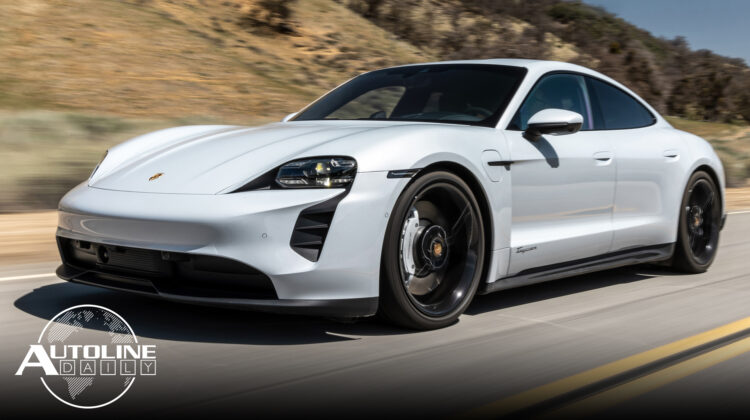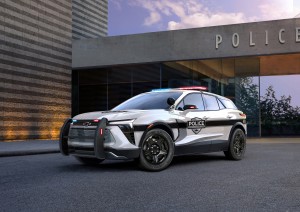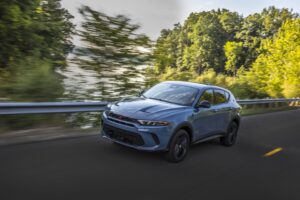
Listen to “AD #3386 – 52 EVs No Longer Qualify for EV Credits; New Car Payments Set All-Time Record; Tesla Dodges A Legal Bullet” on Spreaker.
Follow us on social media:
Runtime: 9:46
0:07 Japan Mad at U.S. EV Credits
0:43 52 EVs No Longer Qualify for EV Credits
1:31 Tesla Dodges A Legal Bullet
2:43 AVs: Vaporware or Revolutionary?
3:03 Chevrolet Blazer EV Lets Police Go Electric
3:39 Dodge Hornet A Lifesaver for The Brand
7:18 BMW Going with Cylindrical Chinese Batteries
7:57 New Car Payments Set All-Time Record
8:57 Global Car Sales Recovering
Visit our sponsors to thank them for their support of Autoline Daily: Bridgestone, Intrepid Control Systems, Schaeffler and Teijin Automotive.
This is Autoline Daily, the show dedicated to enthusiasts of the global automotive industry.
JAPAN MAD AT U.S. EV CREDITS
Yesterday it was Europe and South Korea. Today it’s Japan. They’re all criticizing the new U.S. EV tax credits, because it excludes their EVs. The Japan Automobile Manufacturers Association is upset that the credits are only available to EVs assembled in North America and that they pretty much have to have batteries that were manufactured in the U.S. On top of that, there are price and income caps for receiving the credit. And according to the Alliance for Automotive Innovation, once they do go into effect, nearly all EVs will be ineligible for the incentive.
52 EVs NO LONGER QUALIFY FOR EV CREDITS
Let’s get more specific. There are 72 EV and PHEV models sold in the American market. And beginning today, only 20 of them qualify for the $7,500 tax credit. That’s because to qualify for the credits, they have to be assembled in North America. That means all the BEVs and plugins made by GM, Ford and Stellantis qualify. But so does the Nissan Leaf, the Mercedes EQS and the PHEV versions of the Audi Q5 PHEV, the BMW X5 and 3-series, and Volvo S60. They’re all made either in Mexico or the U.S. Also, anyone who ordered an imported BEV or PHEV before President Biden signed the Inflation Reduction Act will qualify for the credit.
TESLA DODGES A LEGAL BULLET
Tesla has been lambasted over the safety of its Autopilot system. NHTSA, the Transportation Safety Board and even Ralph Nader have dissed the system. But Tesla just won a significant victory in Germany over how it advertises the technology. A German watchdog group filed a complaint over the name Autopilot and the fact that Tesla refers to the system as “autonomous driving.” However, the court didn’t agree and threw out the complaint, which means Tesla can continue to advertise Autopilot as an autonomous system.
AVs: VAPORWARE OR REVOLUTIONARY?
Say, are autonomous cars just a bunch of vaporware, or are they actually going to revolutionize transportation. That’s the topic for Autoline After Hours tomorrow when Mike Ramsey from Gartner Research will be on the show. So join John and Gary as they try to get to the bottom of what’s going on with full autonomous cars.
CHEVROLET BLAZER EV LETS POLICE GO ELECTRIC
Chevrolet is showing off the police version of the Blazer EV. Based on the SS version of the Blazer EV, it comes with skid plates, police-rated tires, steel wheels and other emergency equipment. It also has light-towing capability for things like radar trailers. Chevy will reveal final specifications and the range closer to when the vehicle launches in the first quarter of 2024. But Chevy did say it will be equipped with the “largest possible Ultium battery.”
DODGE HORNET A LIFESAVER FOR THE BRAND
Looks like Carlos Tavares, the CEO of Stellantis, is making good on his promise to revive the Dodge brand with new products. Here comes the Dodge Hornet, a 5-passenger crossover based on the Alfa Romeo Tonale. In fact, the Hornet will be built in Italy and exported to the US. Here are the technical highlights. The base version, the Hornet GT is priced just under $30,000. It comes with a 9-speed automatic and a 2.0-liter turbo four, with a decent 265 horsepower and 295 lb.-ft. of torque.
The Hornet R/T trim is a PHEV with 6-speed automatic and a 1.3-liter turbo that cranks out 285-plus horsepower and 383 lb.-ft. of torque, over 30 miles of all-electric range with a 15.5-kWh lithium-ion battery that has a gas refrigerant to keep it cool. The Hornet PHEV powertrain includes a 90-kW electric rear e-axle motor with 1,844 lb.-ft. of torque. It also has what Dodge calls PowerShot , which gives a 15 second burst of 25 more horsepower, and knocks off a full second off the 0 to 60 time, which is 6.1 seconds. A high-power inverter and 7.4-kW charging module deliver a full battery charge in 2.5 hours using a Level 2 charger.
Other nice bits include Koni shocks, Brembo four-piston brake calipers and dynamic torque vectoring, Inside all the controls are angled towards the driver. There’s a 12.3-inch digital cockpit cluster screen and a 10.25-inch central display. It also comes with a Harman Kardon sound system with 465 watts, 14 speakers and subwoofer. The Hornet GT goes on sale in December, the R/T will be available next spring. Dodge also showed a higher performance concept version called the GLH, which revives the Go Like Hell name that Carroll Shelby came up with for the Omni GLH back in the 1980s. In profile the Hornet looks exactly like the Alfa Tonale. But the designers did a good job of making the front end look exactly like a Dodge. There are plenty more details about the Hornet that you can read about. If you’re watching on the Autoline website, just look for the link that says Continue Reading. If you’re watching on YouTube look below this video to where it says Show More. That will take you to the links where you can get more info.
BMW GOING WITH CYLINDRICAL CHINESE BATTERIES
BMW currently uses prismatic batteries for its electric vehicles but it will soon switch to cylindrical ones. Reuters reports that BMW signed a deal with Chinese battery maker EVE to get cylindrical batteries for EVs it will sell in Europe starting in 2025. The batteries will be similar in size to the 4680 batteries Tesla uses. BMW will also start using cylindrical batteries supplied by CATL starting in 2025. While prismatic batteries can be more easily packaged, cylindrical ones are becoming more cost effective while offering improved range.
NEW CAR PAYMENTS SET ALL-TIME RECORD
New car prices are hitting sky high levels and that’s pricing thousands of consumers out of the new car market. Cox Automotive reports that the typical monthly payment just set an all time record: $733 a month. It now takes the median American household 42.2 weeks of income to buy a new car. Historically, that number was always around 24 weeks. In the last decade it jumped to about 34 weeks. And now it’s 42.2. That’s because the average new car now costs $48,182, and because of higher interest rates. Jonathan Smoke, the chief economist at Cox Automotive, says affordability is an issue, but he also offers a glimmer of hope because as gasoline prices continue to decline he’s seeing a direct improvement in consumer confidence.
GLOBAL CAR SALES RECOVERING
Speaking of a glimmer of hope…though car sales are down all over the world, LMC Automotive says they’ve been on the rise over the last three months, and are currently running at a 90 million a year rate. Most of the growth is coming from China and South America, because all the other major markets are still well down from last year.
And that’s a wrap for today’s show. Thanks for watching.
Thanks to our partner for embedding Autoline Daily on its website: WardsAuto.com
Seamus and Sean McElroy cover the latest news in the automotive industry for Autoline Daily.








